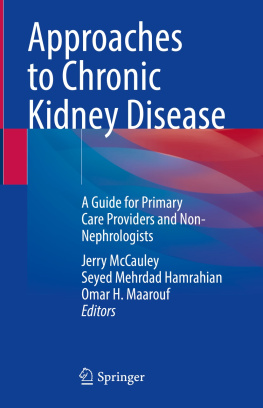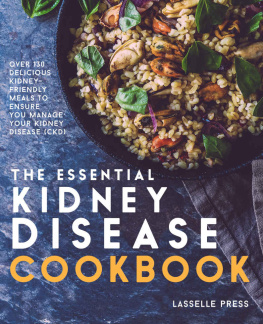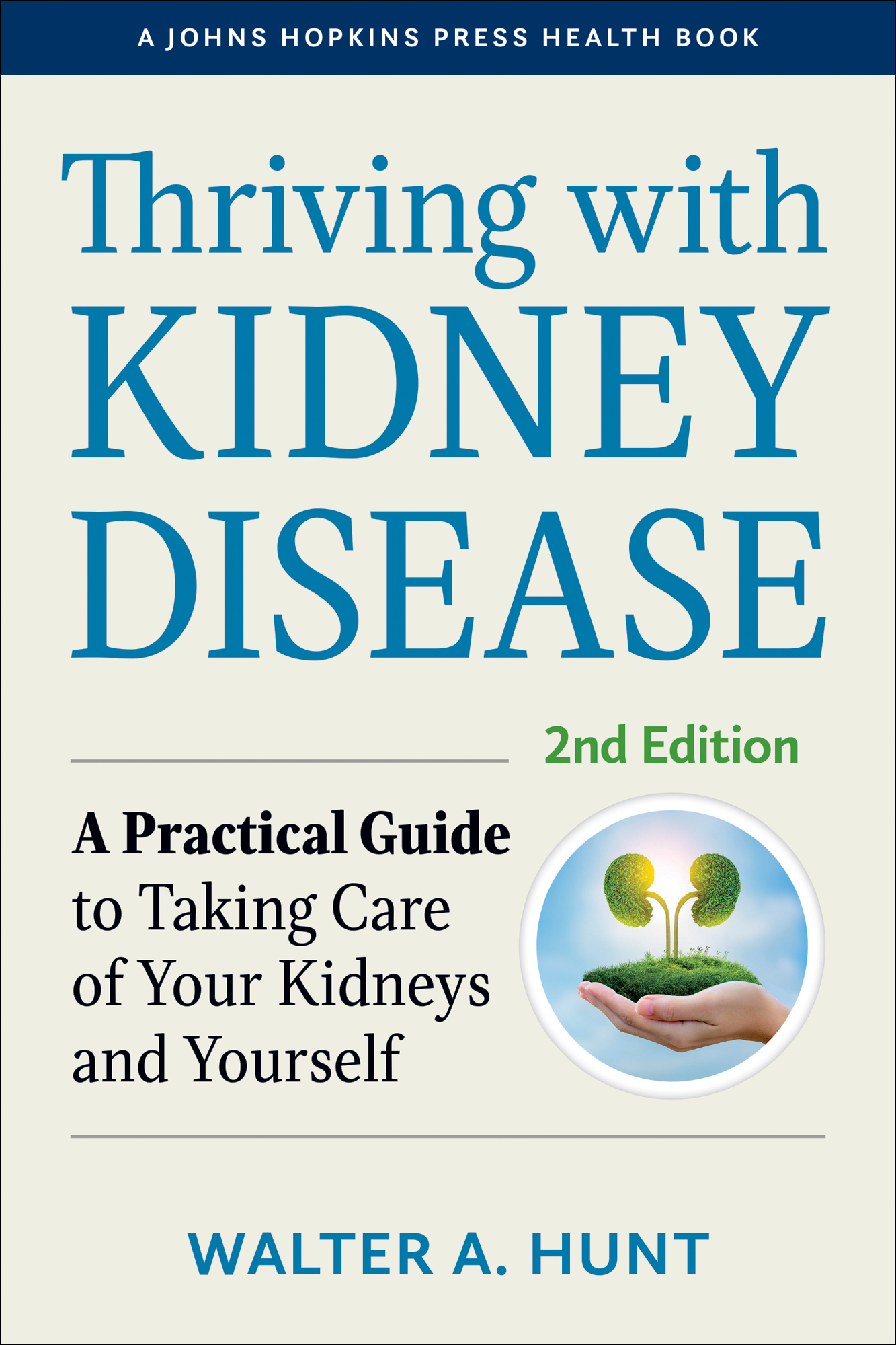Contents
Guide
Thriving with Kidney Disease
A Johns Hopkins Press Health Book
Thriving with
KIDNEY DISEASE
A Practical Guide to Taking Care of Your Kidneys and Yourself
2nd Edition
WALTER A. HUNT
Foreword by Ronald D. Perrone, MD

JOHNS HOPKINS UNIVERSITY PRESS
Baltimore
To my mother and sister, who did not survive kidney disease
Note to the Reader: This book is not meant to substitute for medical care of people with kidney disease, and treatment should not be based solely on its contents. Instead, treatment must be developed in a dialogue between the individual and his or her physician. Our book has been written to help with that dialogue.
The author and publisher have made reasonable efforts to determine that the selection and dosage of drugs discussed in this text conform to the practices of the general medical community. The medications described do not necessarily have specific approval by the US Food and Drug Administration for use in the diseases and dosages for which they are recommended. In view of ongoing research, changes in governmental regulations, and the constant flow of information relating to drug therapy and drug reactions, the reader is urged to check the package insert of each drug for any change in indications and dosage and for warnings and precautions. This is particularly important when the recommended agent is a new and/or infrequently used drug.
2011, 2022 Johns Hopkins University Press
All rights reserved. Published 2022
Printed in the United States of America on acid-free paper
2 4 6 8 9 7 5 3 1
Johns Hopkins University Press
2715 North Charles Street
Baltimore, Maryland 21218-4363
www.press.jhu.edu
Names: Hunt, W. A. (Walter A.) author.
Title: Thriving with kidney disease : a practical guide to taking care of your kidneys and yourself / Walter A. Hunt ; foreword by Ronald D. Perrone, MD.
Other titles: Kidney disease.
Description: Second edition. | Baltimore : Johns Hopkins University Press, 2022. | Series: A Johns Hopkins Press health book | Revision of: Kidney disease. c2011. | Includes bibliographical references and index.
Identifiers: LCCN 2021011717 | ISBN 9781421442891 (hardcover) | ISBN 9781421442907 (paperback) | ISBN 9781421442914 (ebook)
Subjects: LCSH: KidneysDiseasesPopular works.
Classification: LCC RC902 .H85 2022 | DDC 616.6/1dc23
LC record available at https://lccn.loc.gov/2021011717
A catalog record for this book is available from the British Library.
Special discounts are available for bulk purchases of this book. For more information, please contact Special Sales at .
Foreword
Ronald D. Perrone, MD
It is a pleasure to write this foreword. Few books such as this one are available for those individuals diagnosed with kidney disease. Medical information about kidney disease and kidney failure is abundantly available, yet important perspectives from patients who have actually experienced kidney disease, kidney failure, and resulting dialysis and transplantation are not easily obtained. Walter Hunt has provided careful and easily understandable explanations for the layperson and offered his personal experience and perspective of the impact of kidney failure on his life. The revised second edition provides important updates, including coping skills for caregivers, kidney diseases in children, environmental causes of chronic kidney failure, conservative care for those who wish to decline treatment, gout, depression, sleep disturbances and depression in dialysis patients, and diet after transplantation. New approaches for potential treatments of chronic kidney disease, such as drug repurposing, gene editing, and biological markers, are also included.
I congratulate Dr. Hunt for providing this excellent guide for people with kidney disease!
I made the decision to enter the field of nephrology during my second year of medical school while doing my rotation on the inpatient nephrology service. Exposure to the miracle of transplantation and the lifesaving treatment of dialysis provided encouragement that I would have tools as a future physician to help patients overcome serious illness. Prior to the availability of these treatments, kidney failure was a disease with limited therapeutic options.
Working with newly diagnosed or long-term patients with kidney disease provides tremendous opportunities to intervene in their care. When I first encounter newly diagnosed patients with kidney disease, my hope for them is first to provide a diagnosis. If a treatment is available, I implement treatment to halt the inexorable progress of the disease. At this stage, it is very important to educate and inform them and their families about their disease and to enlist their participation in the patients care. Finally, if necessary, I begin the prevention and management of potential complications and provide reassurance about the options for therapy, including dialysis and transplantation. This is not easily accomplished during a single visit but is the beginning of a long-term relationship with multiple opportunities for my patients to ask questions and to receive information from print or electronic sources that help them to understand and manage their disease.
Follow-up visits provide additional opportunities to reinforce the educational messages, to discuss compliance and participation in their care, to interact with additional family members, and to solidify the bond of comfort and trust that occurs with a long-term doctor-patient relationship. Different stages of the disease require different interventions. Long periods of stability are gratifying for all and dont necessarily require large amounts of discussion or intervention; however, by contrast, the approach of kidney failure and the need for dialysis or transplant can be anxiety provoking and requires frequent visits for education, counseling, and medication adjustment.
Receiving a diagnosis of kidney disease is frightening for most individuals. Vivid fears of dialysis and rapid progression to kidney failure are common. More often, interventions can slow the progression of chronic kidney disease and manage the complications. While these are not cures, as when an antibiotic cures pneumonia, nonetheless, these interventions can help to preserve health. Individuals with kidney disease should be fully engaged in the management of their disease as this offers the best possibility for slowing the progression and preventing complications. Being educated about the disease, being compliant with appropriate medication and diet, obtaining a home blood pressure device and regularly measuring/reporting their blood pressure, joining patient support groups, and supporting research and educational efforts by foundations such as the National Kidney Foundation or the Polycystic Kidney Disease Foundation can be empowering and provide multiple opportunities to improve their long-term outcome.
Dialysis is not a perfect treatment for kidney failure, but it saves lives and can provide a reasonable quality of life for those individuals who are compliant with their treatment and dietary and fluid restrictions. Improvements in dialysis technology and the increasing availability of home dialysis and daily dialysis treatments have greatly improved the outcomes for many individuals. Conservative management of advanced kidney failure has recently emerged as a viable option for those who wish to avoid dialysis, with a focus on quality not quantity of life. Transplantation, while not a cure for kidney disease, is an excellent treatment yet still requires frequent visits to medical providers, lots of pills, and potentially serious complications from these potent medications. Greatly improved quality of life and longer life result from this intervention, yet careful compliance and follow-up is still required.











